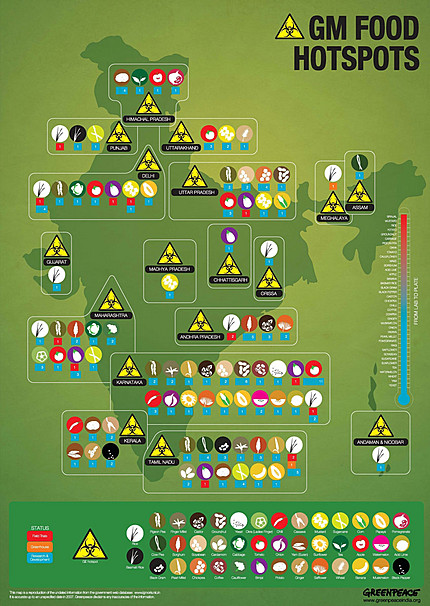|
|
About GM Crops:
GM crops are usually made by crossing the genes of unrelated species, in an attempt to transfer a desired trait. This is unnatural, unpredictable, irreversible and potentially hazardous. For instance, genes from a fish are transferred to tomatoes and from bacteria to plants. Those crops modified with Bt (a bacterium) have Bt toxins in every cell of the plant. This cannot be washed off. How does that matter to us?
-
Health risks: GM food is not safe, and carries significant long term health risks. responsibletechnology.org/health-risks
-
Pesticide Use: GM is falsely promoted as reducing pesticides. Studies from across the world show that pesticides use increases in the long run as the targeted pests develop immunity and secondary pests and new plant diseases multiply.
-
Environmental risks: Once genetically modified organisms (GMOs) are released they cannot be recalled and could pollute and damage our fragile ecosystems. They can also cross-pollinate and contaminate non-GM crops.
http://bit.ly/n7jpPE
-
Bad Ethics: It's irresponsible and short-sighted to put genes from an animal, bacteria, or virus into a plant, or vice-versa. Putting genes from one species into another violates the laws of nature, with unpredictable and potentially disastrous results.
-
The Future: The biotech industry's vision of the future is deeply disturbing. On the other hand, farming systems such as agro-ecology, organic farming and permaculture provide us with sane, sustainable, environmentally caring & healthier options for the future.
Are GM foods safe?
 Contrary to industry claims, GM foods are not properly tested for human safety before they are released for sale. In fact, the only published study directly testing the safety of a GM food on humans found potential problems. Independent studies on GM crops, almost all of which have been animal studies, show serious health risks like allergic reactions, damage to the liver, kidney, pancreas & other organs, higher infant mortality rate among other symptoms. Contrary to industry claims, GM foods are not properly tested for human safety before they are released for sale. In fact, the only published study directly testing the safety of a GM food on humans found potential problems. Independent studies on GM crops, almost all of which have been animal studies, show serious health risks like allergic reactions, damage to the liver, kidney, pancreas & other organs, higher infant mortality rate among other symptoms.
Typically the response to the safety question is that people have been eating GM foods in the United States and elsewhere for more than ten years without ill effects which prove that the products are safe. But GM foods are not labeled in the US, and consumers are not monitored for health effects. Although the full effects of health effects of GM foods could take decades to become known or be recognized, medical problems have already prompted the American Academy of Environmental Medicine (AAEM), in a policy paper in May 2009, urged all doctors to prescribe non-GMO diets for everyone – Read more at GMWatch.org.
What's happening in India?
Bt Cotton is the only GM crop grown in India to date. Farmer suicides have not abated but increased after its introduction. Bt Brinjal was the first food crop which was to be introduced. It has been placed on a 2 year moratorium because of farmer and consumer opposition throughout the nation. There are attempts to lift the moratorium and 74 http://bit.ly/lx7TobGM crops are awaiting clearance in India.
What's happening abroad?
Consumers in the European Union and in about 90% of the world’s countries have rejected GM crops. Only 2.4% of the world’s land is under GM. Nations, and regions within nations, are demanding to be GM-free. Even in the USA, as more people become aware of the ills of GM food, consumers are starting to reject it. The billion dollar Indian market is therefore one of the prime business opportunities for multi-national seed companies that benefit the most from GM technology and are seeking to control seed and food in the developing world.
|
|
Related Stories:
 About GM Corps About GM Corps
Read more
 Environmental Risks of Environmental Risks of
GM Crops
Read more
 Everything You Eat Everything You Eat
Will Be GM
Read more
 Wrong Bill by the Wrong Bill by the
Wrong People
Read more
Who Benefits from GM Crops?
A study by Friends of the Earth International:
Read more
Monsanto’s True Colours:
Read more
NEWS:
USDA to allow Biotech Corp to test their own crop:
Read more
NEWS:
Scientists discount arguments that GM increases yield:
Read more
ProQuest/CSA site on GM Food:
Read more
|
|







 Contrary to industry claims, GM foods are not properly tested for human safety before they are released for sale. In fact, the only published study directly testing the safety of a GM food on humans found potential problems. Independent studies on GM crops, almost all of which have been animal studies, show serious health risks like allergic reactions, damage to the liver, kidney, pancreas & other organs, higher infant mortality rate among other symptoms.
Contrary to industry claims, GM foods are not properly tested for human safety before they are released for sale. In fact, the only published study directly testing the safety of a GM food on humans found potential problems. Independent studies on GM crops, almost all of which have been animal studies, show serious health risks like allergic reactions, damage to the liver, kidney, pancreas & other organs, higher infant mortality rate among other symptoms.